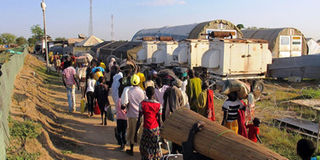South Sudan civil war fears grow as rebels reject talks

Civilians walking inside the UNMISS compound in Bor, on December 18, 2013, following the fierce fighting that has killed hundreds of people and sent thousands fleeing to UN bases. South Sudan rebels battling government forces rejected peace efforts on December 19, 2013 as the region scrambled to prevent the world's youngest state from collapsing only two years after its birth. PHOTO | AFP
What you need to know:
- Kiir has said he was ready to "sit down" but Machar, who was sacked by the president in July, rejected the offer
- Some 450 people had been killed in the capital Juba since battles broke out on Sunday, including around 100 soldiers
- Machar, who fought on both sides during Sudan's 1983-2005 civil war, has been accused of leading a brutal massacre in Bor in 1991
JUBA
South Sudan rebels battling government forces rejected peace efforts on Thursday as the region scrambled to prevent the world's youngest state from collapsing only two years after its birth.
Troops loyal to fugitive former vice president Riek Machar seized the town of Bor late Wednesday, army spokesman Philip Aguer said, as fighting continued in eastern Jonglei state.
President Salva Kiir has blamed the bloodshed on a coup bid by his perennial rival Machar, who says the alleged overthrow was a fabrication to cover up a regime purge.
Kiir has said he was ready to "sit down" but Machar, who was sacked by the president in July, rejected the offer.
In an interview with RFI radio on Thursday, Machar said he had appealed to the ruling party and army "to remove Salva Kiir from the leadership of the country."
Some 450 people had been killed in the capital Juba since battles broke out on Sunday, including around 100 soldiers, Aguer said.
AFP reporters said the city was calm on Thursday.
Human Rights Watch said witnesses had reported horrific cases of both soldiers and rebels executing people based on their ethnicity, warning it could lead to "revenge attacks and more violence."
The battles have raised concerns of ethnic conflict, with Kiir coming from the majority Dinka people and Machar from the Nuer.
Soldiers in Juba "asked individuals about their ethnicity before killing or releasing them", or identified them from traditional facial scarring, HRW said.
However, the government insists the clashes are over power and politics, noting that both sides include leaders from different tribes.
"We condemn in strongest possible terms attempts to depict (the) coup as ethnic strife," a government statement Thursday read, noting that of the 11 key figures arrested since fighting began -- many former powerful minsters -- only two were Nuer.
'On the cusp of a civil war'
The United Nations peacekeeping mission said it was sheltering civilians in six state capitals, including Juba and Bor, as well as in Bentiu, the main town of the crucial petroleum-producing state of Unity.
At least five oil workers were killed in Unity when attackers stormed their compound late on Wednesday, a company official said.
Oil production forms over 95 percent of South Sudan's fledgling economy.
Foreigners were being evacuated from the troubled country, with the United States and Britain sending in flights for their citizens, and others fleeing overland south to Uganda.
Long lines of aid workers and expatriates began crowding Juba's airport on Wednesday waiting to board the first flight they could out of the country, with delays after an aircraft that crash landed -- with no casualties -- blocked the runway for several hours.
UN chief Ban Ki-moon has warned fighting could spread.
"There is a risk of this violence spreading to other states, and we have already seen some signs of this," Ban said, adding the crisis "urgently needs to be dealt with through political dialogue."
There were fears that the poor and unstable nation, which broke free from Sudan in 2011, could slide back into all-out conflict.
"The scenario many feared but dared not contemplate looks frighteningly possible: South Sudan, the world's newest state, is now arguably on the cusp of a civil war," the International Crisis Group (ICG) think tank warned.
PEACE EFFORTS
Top ministers from four regional countries flew in Thursday to try to launch peace efforts.
Kenya's Foreign Minister Amina Mohammed told AFP she was working with diplomats from Djibouti, Ethiopia and Uganda, calling the crisis a "regional issue."
All are members of a regional body, the Inter-Governmental Authority on Development (IGAD), whose members played key roles in pushing forward the 2005 deal that ended Sudan's two-decades long civil war with the south.
The capture of Bor raises ugly ghosts from South Sudan's past.
The town, which lies some 200 kilometres (125 miles) north of Juba, is the capital of the state of Jonglei, one of the most volatile regions in the young nation.
Machar, who fought on both sides during Sudan's 1983-2005 civil war, has been accused of leading a brutal massacre in Bor in 1991.
Powerful military commander Peter Gadet -- who rebelled in 2011 but then rejoined the army -- has also mutinied again, launching attacks in Jonglei in support of Machar.
"They are fighting in the bush," said Aguer.
Jok Madut Jok, a former government minister and academic now running Juba's Sudd Institute think tank, warned that while the capital was now calm there had been "ghastly acts of revenge... stoking what might escalate into tragic acts of ethnic cleansing."





